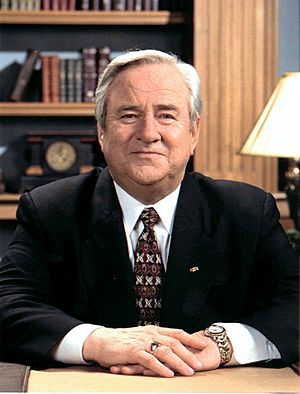Moral Majority facts for kids

The Moral Majority was an American political group that was active in the 1980s. It was connected to the Christian right movement and the Republican Party. The group was started in 1979 by a Baptist pastor named Jerry Falwell Sr..
The Moral Majority's main goal was to get conservative Christians more involved in politics. They believed this would help protect what they called "traditional family values." The group was very influential during the 1980s and helped Republican presidents, like Ronald Reagan, win elections. It was closed down in 1989.
Contents
The Story of the Moral Majority
How It Started
The idea for the Moral Majority began in 1976. Pastor Jerry Falwell Sr. started holding "I Love America" rallies all over the country. At these rallies, he talked about social issues that he felt were important.
Traditionally, many Baptist leaders believed that religion and politics should be kept separate. But Falwell felt that the country's morals were declining, and he decided he needed to get involved. These rallies helped him see that many people agreed with him.
In 1979, Falwell met with other conservative leaders like Paul Weyrich. Weyrich suggested the name "Moral Majority," and together they officially created the organization. They wanted to build a powerful political force based on conservative Christian beliefs.
Gaining Influence
The Moral Majority grew very quickly. By 1980, it had chapters in 18 states. Falwell used his popular TV show, Old Time Gospel Hour, to reach millions of people and ask for their support.
The group's main office was in Lynchburg, Virginia, where Falwell led a large church. While Falwell was the main leader, he made sure to include Catholics and Jews in the group's leadership to show it was open to different faiths.
At its peak, the Moral Majority said it had over four million members and two million donors. This made it one of the most powerful conservative lobby groups in the United States. In 1985, it became part of a larger group called the Liberty Federation but kept its own name and mission.
What Did They Believe In?
The Moral Majority wanted to get conservative Americans to take action on political issues. They used direct mail, phone calls, rallies, and TV shows to spread their message.
The group was successful because it had strong funding and clear leadership. Its leaders were good at organizing people and communicating their ideas. They focused on issues that many people were already concerned about.
Some of the main goals of the Moral Majority were:
- To promote what they called traditional family values.
- To oppose media they felt was against family values.
- To oppose the Equal Rights Amendment.
- To disagree with laws that supported gay rights.
- To allow Christian prayers in public schools.
A "Pro-Family" Agenda
The Moral Majority brought many different issues together under the idea of "pro-family." They argued that things like feminism and gay rights were attacks on the traditional American family. This message connected with many religious conservatives.
Instead of directly attacking their opponents, they often used "pro-family" language. For example, they would define a family as only having a mother and a father. As the group became more powerful in the 1980s, their language became more direct. They often said that the gay rights movement was a threat to children and families.
Getting Involved in Politics
The Moral Majority was very active in politics. They tried to influence lawmakers through mail and phone calls. They also worked to get certain candidates elected.
The group encouraged its members to vote. They held voter registration drives at churches, believing that these new voters would support candidates endorsed by the Moral Majority. Pastors were asked to guide their church members on who to vote for.
The 1980 Election: Supporting Reagan
In 1976, Jimmy Carter, an evangelical Christian, was elected president. At first, many religious conservatives were happy. But they soon became disappointed with his policies. Carter, a Democrat, did not support many of the Moral Majority's goals.
Because of this, the Moral Majority decided to support Ronald Reagan for president in 1980. They spent millions of dollars on ads to help Reagan and criticize Carter. After Reagan won, Falwell claimed that the Moral Majority's efforts were a major reason for his victory. Reagan even appointed the Moral Majority's first executive director, Robert Billings, as an advisor.
The 1984 and 1988 Elections
The Moral Majority continued to support Reagan in his 1984 reelection campaign. They helped shape the Republican Party's platform. However, some studies suggest that by 1984, the group's name may have turned some voters away from Reagan.
The 1988 election was the last one where the Moral Majority was active. Instead of supporting fellow televangelist Pat Robertson, Falwell endorsed George H. W. Bush. This showed that there were rivalries even within the Christian right movement.
The End of the Moral Majority
By the late 1980s, the Moral Majority began to lose support and money. After eight years of Ronald Reagan as president, many of its supporters felt that the country was no longer in a moral crisis. Donations dropped, and the group faced financial problems.
In 1989, Jerry Falwell officially closed the Moral Majority. He said that its mission was complete. He believed the "religious right" was now a permanent part of American politics.
In 2004, Falwell started a new group called the Moral Majority Coalition. He wanted to continue helping conservative politicians get elected. Falwell led this new group until he passed away in 2007.
See also
 In Spanish: Mayoría Moral para niños
In Spanish: Mayoría Moral para niños
 | Jewel Prestage |
 | Ella Baker |
 | Fannie Lou Hamer |

